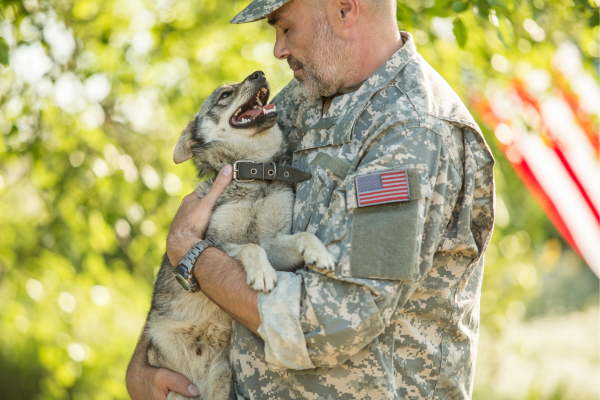Post-Traumatic Stress Disorder (PTSD) has perhaps existed for as long as humanity has experienced trauma, but it was not until 1980 that it became a mental health diagnosis. Research from the VA has shown that approximately 6% of the population experiences PTSD in their lifetime. This particularly impacts veterans, who are more likely to suffer from PTSD than civilians. Frightening or high-stress events bring on the condition, and the symptoms are grouped into four main categories: intrusion or re-experiencing, avoidance, alteration in mood and cognition, and hyperarousal. A PTSD service dog is a unique tool in helping those suffering from PTSD to go about common tasks.
People with PTSD often become isolated as their symptoms make it difficult for them to carry on a normal daily routine and freely interact with others. However, the simple act of having a non-judgmental and committed companion such as a dog can be a huge boost. Trained PTSD service dogs have proven to reduce the severity of PTSD symptoms by providing a sense of safety and security, physical exercises, and other tasks that help lessen the devastating impact of PTSD.
Watch a trained PTSD service dog, Coop, support his handler Mike in the every day task of shopping at Target:
@coop_n_mike Quick Target trip with my best bud on 4 legs, & PTSD Service Dog, “Coop-Ditty” 😊… If you’re a Veteran with PTSD, & you experience issues in public or social/situational anxiety of any kind, I promise you, a Service Dog 🐕🦺 could change all of it for you & enable you the ability to get back to a more normal everyday life; helping you to further have experiences you thought your issues before having him/her, would always prevent you from having… #veterans #servicedog #foryou #dogsoftiktok #dogs #dog #miltok #vettok #servicedoglife #ptsd #ptsdservicedog #combatvet #oif #oef #vietnam #desertshield #desertstorm #keepmovingforward #servicedogsoftiktok #veterantok #servicedogtok #veteranservicedog #englishlabrador #blacklab #🐕🦺 #servicedogssavelives #experiencelife #newnormal #backtothelandoftheliving #coopnmike ♬ Epic Motivational – StereojamMusic
While medications and psychotherapy are effective treatments for PTSD, complementary and alternative therapies like the use of service dogs are also gaining popularity. Florence Nightingale first documented the therapeutic potential of animals in the late 1800s. While working in a psychiatric facility, she observed how patients responded to interaction with small pets and established that they displayed reduced anxiety and stress. It was, however, in the 1960s that the labeled concept of Animal-assisted therapy was introduced.
How Do Service Dogs Assist Handlers With PTSD?
As mentioned earlier, each service dog undergoes specific training to assist with their handlers’ needs. PTSD service dog tasks mostly include providing emotional support and companionship, which can lower the level of the stress hormone cortisol and consequently reduce the symptoms of PTSD.
Examples of tasks service dogs might be trained to perform include:
- Mitigate anxiety and disrupt anxiety behaviors: PTSD service dogs are trained to recognize symptoms of anxiety and perform tasks to disrupt anxiety behaviors. The dog can nudge, paw, or lick their handler until they redirect their focus on the dog instead of on the anxiety. Service dogs also help reduce anxiety in social settings by providing a cushion between the handler and other people.
- Interrupt night terrors: Night terrors are a manifestation of the intrusion symptom. A service dog can recognize the cues that their hander is experiencing night terrors and help by waking them up by nudging, licking, lying on their chest, or even turning on the lights to provide a feeling of safety.
- Assist in performing safety checks and room searches: Hypervigilance is a prevalent PTSD symptom and is often characterized by extreme sensitivity to one’s surroundings and a looming presumption of danger. To control this symptom, your service dog can perform room searches and safety checks and alert the handler that the house or room is safe.
- Help with dissociation: PTSD patients who experience flashbacks, disconnection of the self, and detachment from reality can have a service animal guide them to a safe place, an exit, back home, or even to find a specific person. Service dogs help to ground their handlers and ensure they keep in check with reality.
- Service dogs can also help retrieve medication in times of crisis.
How Are Service Dogs Trained to Work with Individuals With PTSD?
PTSD service dog training starts as early as when a puppy is eight weeks old and can take anywhere from 18 months to 2 years. Once the dog completes basic service training, they meet their handler and start to train to meet their specific requirements. During training, the dogs are evaluated for obedience, temperament, and tolerance to noise and distractions to ensure suitability to different situations and environments.
PTSD service dog Shiloh completes her training:
Not all dogs that start training successfully become service dogs. However, when dogs fail to meet the requirements of becoming service animals, the effort is still well-spent. The dogs are usually placed in other roles where they can still be helpful to people, for example, as emotional support animals. Unlike service dogs, emotional support dogs are not required to perform specific tasks to their handler’s condition. Service dogs are also legally protected and have unrestricted access, while emotional support dogs may be restricted in some settings.
Therapeutic Benefits of Service Dogs to PTSD Patients
Service dogs play a crucial role in supporting their owners living with PTSD by providing invaluable companionship, support, and practical assistance. They empower PTSD patients and ground their lives with routine and responsibility, which helps create a sense of purpose and confidence.
These are just a few ways that a service dog can help PTSD patients. However, there are more tasks and benefits that a service dog can provide to each handler and their unique situation. If you’d like to support more education and advocacy around service dogs for veterans and others with PTSD, please reach out or consider donating to Justice Speaks!


